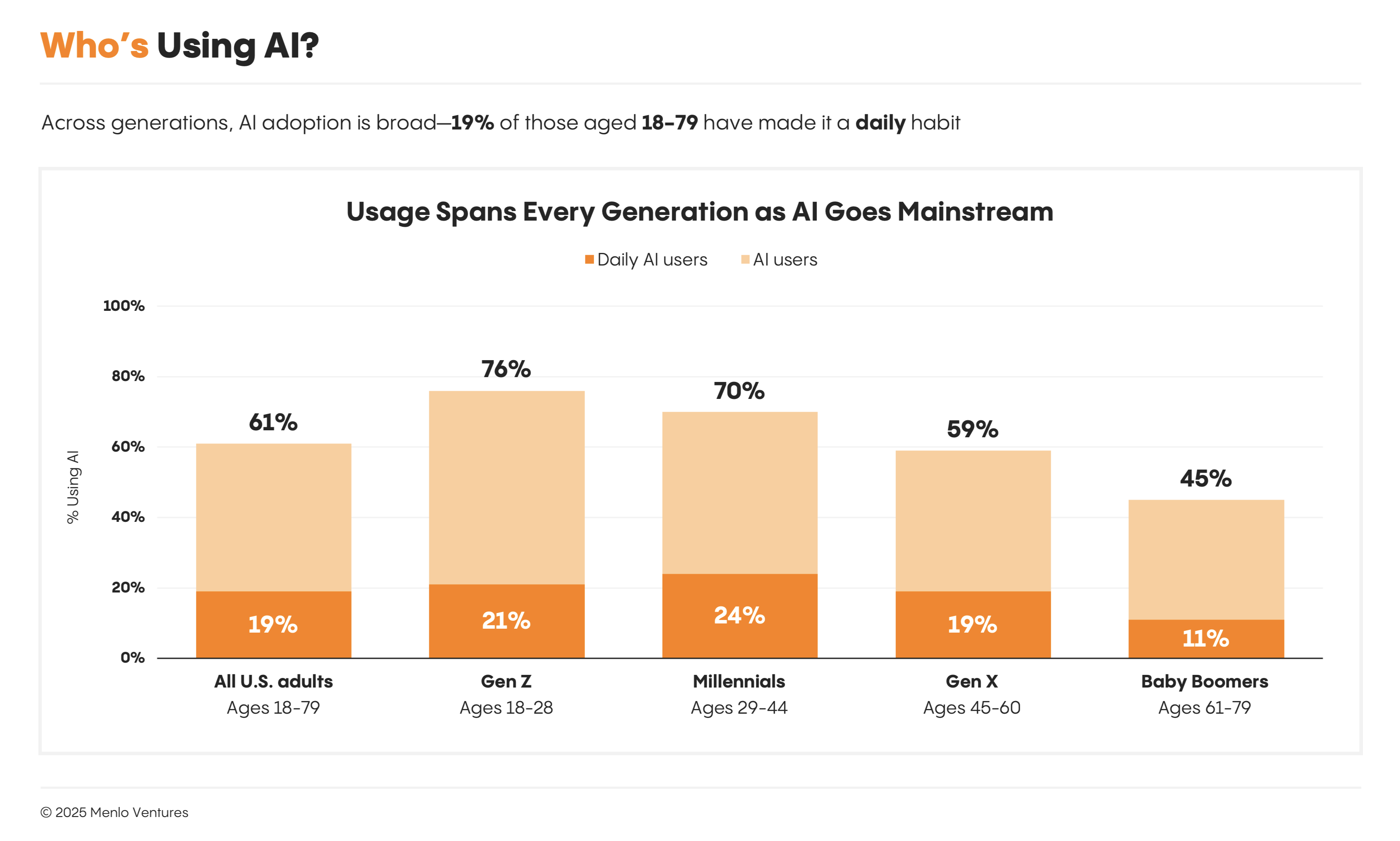The State of Consumer AI: AI’s Consumer Tipping Point Has Arrived - Only 3%* of US AI users are willing to pay for it.
-
This post did not contain any content.

2025: The State of Consumer AI | Menlo Ventures
Based on a survey of over 5,000 U.S. adults, Menlo Ventures unpacks consumer AI adoption in 2025, with key takeaways for founders.

Menlo Ventures (menlovc.com)
-
This post did not contain any content.

2025: The State of Consumer AI | Menlo Ventures
Based on a survey of over 5,000 U.S. adults, Menlo Ventures unpacks consumer AI adoption in 2025, with key takeaways for founders.

Menlo Ventures (menlovc.com)
That's a weird editorializing of the headline, for an article that describes wide spread use, and a market of rapidly growing value.
For instance a sentence like these:
This is no longer experimentation; it’s habit formation at an unprecedented scale.
This rapid adoption drives real dollars: In the two and a half years since OpenAI’s ChatGPT introduced the public to generative AI, consumer AI has become a multibillion-dollar market.
One of the most surprising findings? Parents are among the most engaged AI users, turning to AI for everyday help.
Even ChatGPT, with its first-mover advantage, only converts about 5% of its weekly active users into paying subscribers
Considering there's a pretty strong free option, 5% is not bad.
How many pay for using Youtube? IDK but my guess is that it is way less than 5%.
How many pay for using search? My bet is that we are in the thousandth on that. Yet search is profitable! -
This post did not contain any content.

2025: The State of Consumer AI | Menlo Ventures
Based on a survey of over 5,000 U.S. adults, Menlo Ventures unpacks consumer AI adoption in 2025, with key takeaways for founders.

Menlo Ventures (menlovc.com)
A survey with the takeaways really gussying up AI and how people that don't use AI haven't had their aha moment yet.
-
This post did not contain any content.

2025: The State of Consumer AI | Menlo Ventures
Based on a survey of over 5,000 U.S. adults, Menlo Ventures unpacks consumer AI adoption in 2025, with key takeaways for founders.

Menlo Ventures (menlovc.com)
One way to interpret this is "ha, people consider AI worthless!"
However another way to interpret this is the same way users view everything on the web, from social media to journalism and media streaming: this should be free and they should use my data and advertise to me instead, consequences/enshittification be damned.
-
That's a weird editorializing of the headline, for an article that describes wide spread use, and a market of rapidly growing value.
For instance a sentence like these:
This is no longer experimentation; it’s habit formation at an unprecedented scale.
This rapid adoption drives real dollars: In the two and a half years since OpenAI’s ChatGPT introduced the public to generative AI, consumer AI has become a multibillion-dollar market.
One of the most surprising findings? Parents are among the most engaged AI users, turning to AI for everyday help.
Even ChatGPT, with its first-mover advantage, only converts about 5% of its weekly active users into paying subscribers
Considering there's a pretty strong free option, 5% is not bad.
How many pay for using Youtube? IDK but my guess is that it is way less than 5%.
How many pay for using search? My bet is that we are in the thousandth on that. Yet search is profitable!Youtube and search have ads as the main revenue source, not subscriptions. It's not a fair comparison.
-
One way to interpret this is "ha, people consider AI worthless!"
However another way to interpret this is the same way users view everything on the web, from social media to journalism and media streaming: this should be free and they should use my data and advertise to me instead, consequences/enshittification be damned.
I think also the fact that AI subscriptions are generally quite expensive, when compared with other online subscriptions.
Copilot Pro: £19.00/month
ChatGPT Plus: £18.99/month
Gemini: £18.99/month
Claude Pro: £15.00/monthCompared to (just off the top of my head):
Microsoft 365 Personal: £8.49/month
Google Play Pass: £4.99/month
Adobe Photography Plan (Photoshop, Lightroom, and 20GB cloud storage): £9.98/month
Apple Arcade: £6.99/month
PlayStation Plus Premium (top tier): £13.49/month
Amazon Prime: £8.99/monthAnd it has a free offering, so there's not even a pressing reason to upgrade for most people.

-
One way to interpret this is "ha, people consider AI worthless!"
However another way to interpret this is the same way users view everything on the web, from social media to journalism and media streaming: this should be free and they should use my data and advertise to me instead, consequences/enshittification be damned.
The key difference being that AI is a much, much more expensive product to deliver than anything else on the web. Even compared to streaming video content, AI is orders of magnitude higher in terms of its cost to deliver.
What this means is that providing AI on the model you're describing is impossible. You simply cannot pack in enough advertising to make ChatGPT profitable. You can't make enough from user data to be worth the operating costs.
AI fundamentally does not work as a "free" product. Users need to be willing to pony up serious amounts of money for it. OpenAI have straight up said that even their most expensive subscriber tier operates at a loss.
Maybe that would work, if you could sell it as a boutique product, something for only a very exclusive club of wealthy buyers. Only that model is also an immediate dead end, because the training costs to build a model are the same whether you make that model for 10 people or 10 billion, and those training costs are astronomical. To get any kind of return on investment these companies need to sell a very, very expensive product to a market that is far too narrow to support it.
There's no way to square this circle. Their bet was that AI would be so vital, so essential to every facet of our lives that everyone would be paying for it. They thought they had the new cellphone here; a $40/month subscription plan from almost every adult in the developed world. What they have instead is a product with zero path to profitability.
-
The key difference being that AI is a much, much more expensive product to deliver than anything else on the web. Even compared to streaming video content, AI is orders of magnitude higher in terms of its cost to deliver.
What this means is that providing AI on the model you're describing is impossible. You simply cannot pack in enough advertising to make ChatGPT profitable. You can't make enough from user data to be worth the operating costs.
AI fundamentally does not work as a "free" product. Users need to be willing to pony up serious amounts of money for it. OpenAI have straight up said that even their most expensive subscriber tier operates at a loss.
Maybe that would work, if you could sell it as a boutique product, something for only a very exclusive club of wealthy buyers. Only that model is also an immediate dead end, because the training costs to build a model are the same whether you make that model for 10 people or 10 billion, and those training costs are astronomical. To get any kind of return on investment these companies need to sell a very, very expensive product to a market that is far too narrow to support it.
There's no way to square this circle. Their bet was that AI would be so vital, so essential to every facet of our lives that everyone would be paying for it. They thought they had the new cellphone here; a $40/month subscription plan from almost every adult in the developed world. What they have instead is a product with zero path to profitability.
I'm patently against subscriptions but am currently paying for ChatGPT plus. I'm also that girl who's installed other models on some decently beefy machines and have compared/contrasted. While I also don't think AI is going to be everything to all people and that it has very specific applications, I'm literally the target audience and I've found ChatGPT to be superior in everything except math/complex problems/coding. That's what I've got Mixtral for. ^_^
-
Youtube and search have ads as the main revenue source, not subscriptions. It's not a fair comparison.
Paying gives advantages on youtube, just the same as ChatGPT.
-
Paying gives advantages on youtube, just the same as ChatGPT.
I asked Claude for the data (hehe):
"YouTube is primarily an advertising-driven business model (73% ads vs 27% subscriptions), while ChatGPT operates as a subscription-first business (84% subscriptions vs 15% API/other revenue)."
See the difference?
-
I'm patently against subscriptions but am currently paying for ChatGPT plus. I'm also that girl who's installed other models on some decently beefy machines and have compared/contrasted. While I also don't think AI is going to be everything to all people and that it has very specific applications, I'm literally the target audience and I've found ChatGPT to be superior in everything except math/complex problems/coding. That's what I've got Mixtral for. ^_^
Thank God someone else has a well-thought-out well-reasoned interpretation of all of this. And the same use case as me. Cheers, Internet, friend.

-
NOLA city council surprise discussion of facial recognition tech scheduled for this morning (June 30th) at 10 am
Technology 1
1
-
-
-
-
-
An AI analyst made 30 years of stock picks – and outperformed human investors by a ‘stunning’ degree
Technology 1
1
-
Telegram, the FSB, and the Man in the Middle: The technical infrastructure that underpins Telegram is controlled by a man whose companies have collaborated with Russian intelligence services.
Technology 1
1
-





